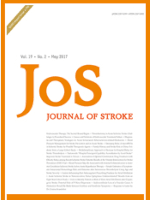
Journal of Stroke
Scope & Guideline
Advancing Stroke Research for a Healthier Tomorrow
Introduction
Aims and Scopes
- Stroke Epidemiology and Risk Factors:
Research focusing on the incidence, prevalence, and risk factors associated with stroke, including demographic studies and the impact of comorbidities. - Acute Stroke Management:
Studies related to the acute management of stroke, including thrombolysis, thrombectomy, and the role of various treatment protocols and guidelines. - Rehabilitation and Recovery:
Exploration of rehabilitation strategies post-stroke, including physical therapy, occupational therapy, and the use of technology in enhancing recovery. - Neurovascular Imaging and Biomarkers:
Research into neuroimaging techniques and biomarkers for stroke diagnosis, prognosis, and treatment efficacy. - Patient Outcomes and Quality of Life:
Investigations into the long-term outcomes of stroke patients, including quality of life assessments and the impact of psychological factors. - Innovative Therapies and Interventions:
Evaluation of new therapies and interventions, including pharmacological treatments, lifestyle modifications, and technological solutions in stroke care. - Health Systems and Policy:
Studies addressing health systems, policy implications, and disparities in stroke care, particularly in low-resource settings.
Trending and Emerging
- Telemedicine and Remote Care:
The COVID-19 pandemic has accelerated the integration of telemedicine in stroke care, leading to increased research on remote assessments and virtual rehabilitation. - Artificial Intelligence and Machine Learning:
There is a growing trend towards the application of AI and machine learning in stroke diagnosis, treatment planning, and outcome prediction, reflecting advancements in technology. - Patient Engagement and Experience:
Research focusing on the experiences and perspectives of stroke survivors and caregivers is gaining momentum, emphasizing the importance of patient-centered care. - Multidisciplinary Approaches to Stroke Rehabilitation:
Emerging studies highlight the effectiveness of multidisciplinary strategies in stroke rehabilitation, indicating a shift towards comprehensive care models. - Longitudinal Studies on Cognitive Outcomes:
Increasing attention is being paid to the long-term cognitive outcomes following stroke, including the assessment of cognitive decline and rehabilitation effectiveness. - Health Disparities and Social Determinants of Health:
An increasing focus on health disparities, particularly how socioeconomic factors influence stroke outcomes and access to care, is becoming more prevalent.
Declining or Waning
- Traditional Risk Factor Studies:
Research focusing solely on traditional risk factors for stroke (e.g., hypertension, diabetes) may be waning as new studies increasingly explore multifactorial and systemic approaches. - Single-therapy Focus:
There appears to be a shift away from studies that evaluate the efficacy of single therapies in favor of multi-modal treatment approaches that consider patient-centered care. - Basic Science Studies:
While foundational research is crucial, there is a notable decline in basic science studies presented in the journal, with a stronger emphasis on clinical applications and outcomes.
Similar Journals

Archives of Neuroscience
Connecting research and therapy for neurological breakthroughs.Archives of Neuroscience is a multidisciplinary journal dedicated to advancing the field of neuroscience through the publication of original research articles, review papers, and case studies. Published by BRIEFLAND, this journal aims to bridge the gap between neuroscience research and clinical applications, fostering a deeper understanding of brain function, neurological disorders, and potential therapeutic approaches. With an ISSN of 2322-3944 and an E-ISSN of 2322-5769, Archives of Neuroscience serves as an essential platform for researchers, professionals, and students alike, encouraging open access to knowledge and insights that drive innovation in the field. Although coverage was discontinued in Scopus from 2016 to 2017, the journal continues to uphold rigorous standards of academic excellence, making it a valuable resource for the neuroscience community seeking to explore and disseminate new findings. The journal is committed to providing timely access to research tools and findings that are crucial for informed decision-making in both academic and clinical settings.
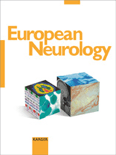
EUROPEAN NEUROLOGY
Bridging Theory and Practice in NeurologyEuropean Neurology, published by KARGER, is a distinguished journal in the field of neurology, catering to both clinical and neuroscience specialties. Since its inception in 1897 and continuing through 2024, the journal has been a vital platform for disseminating significant research findings and insights in neurology. With an ISSN of 0014-3022 and E-ISSN of 1421-9913, it ranks in the Q3 quartile in both clinical neurology and general neurology categories, reflecting its commitment to scholarly excellence while holding the 175th rank in clinical medicine and the 93rd in neuroscience, according to Scopus metrics. European Neurology facilitates a deeper understanding of neurological disorders and treatments, appealing to a diverse readership that includes researchers, clinicians, and students alike. Despite not currently offering open access, the journal’s rigorous peer-review process ensures that only high-quality research reaches its audience, making it an essential resource for those looking to stay informed in the rapidly evolving field of neurology.

Journal of Neurologic Physical Therapy
Advancing Rehabilitation through Neurologic InsightsJournal of Neurologic Physical Therapy, published by Lippincott Williams & Wilkins, stands as a premier resource in the field of physical therapy with a specific focus on neurology. With an ISSN of 1557-0576 and an E-ISSN of 1557-0584, this journal serves as a vital platform for researchers, practitioners, and students from 2004 to 2024, illustrating its commitment to advancing knowledge in neurologic rehabilitation. It holds a prestigious Q1 ranking in categories such as Physical Therapy, Sports Therapy, and Rehabilitation and Rehabilitation, alongside Q2 rankings in Geriatrics and Gerontology, Medicine (Miscellaneous), and Neurology (Clinical). With an impact factor that reflects its significance, the journal hosts comprehensive studies and clinical insights that propel practice and innovation in neurologic physical therapy. The content is designed to enhance understanding and skills, making it an indispensable resource for those dedicated to improving patient care and outcomes in this critical area of health.
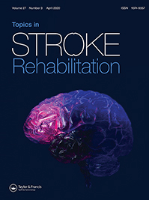
Topics in Stroke Rehabilitation
Enhancing lives with cutting-edge insights.Topics in Stroke Rehabilitation, published by Taylor & Francis Ltd, stands as a premier academic journal offering cutting-edge research and insights in the fields of rehabilitation, neurology, and community care. With an impressive impact factor reflecting its strong scholarly influence, this journal not only maintains a distinguished Q1 ranking in Community and Home Care and Rehabilitation but is also recognized in the Q2 category for Clinical Neurology, showcasing its relevance across multiple disciplines. Covering a comprehensive range of topics from neurorehabilitation techniques to patient-centered care strategies, Topics in Stroke Rehabilitation serves as an essential resource for researchers, healthcare professionals, and students dedicated to enhancing the quality of life for individuals recovering from stroke. With an accessible archive dating back to 1996 and continuous publication through 2024, this journal invites collaboration and discourse, fostering advancements in both theoretical knowledge and practical applications within the realm of stroke rehabilitation.

CEREBROVASCULAR DISEASES
Exploring the intersection of cardiology and neurology.CEREBROVASCULAR DISEASES is a prestigious journal published by KARGER that focuses on the critical field of cerebrovascular health, encompassing research and advancements in cardiology and neurology. With a strong emphasis on high-quality, peer-reviewed publications, the journal has established itself as an essential resource since its inception in 1987, contributing to the understanding and management of cerebrovascular disorders. It holds a commendable Q2 ranking across various categories, including Cardiology and Cardiovascular Medicine, which underscores its influence within the research community. The journal is especially significant for professionals and researchers interested in the intersection of neurological and cardiovascular health, facilitating knowledge sharing and innovative research. Although it does not operate under an Open Access model, the journal is well-regarded for its rigorous selection criteria and impactful findings. By continuing to publish cutting-edge research, CEREBROVASCULAR DISEASES aims to foster advancements in treatment and prevention strategies for cerebrovascular diseases, thereby contributing to improved patient outcomes worldwide.

Cerebrovascular Diseases Extra
Empowering Global Collaboration in Cardiovascular MedicineCerebrovascular Diseases Extra is a distinguished open-access journal published by KARGER, operating out of Switzerland since 2011. With ISSN 1664-5456, this journal aims to bridge the gap in knowledge surrounding cerebrovascular diseases, an essential segment of both Cardiology and Cardiovascular Medicine as well as Neurology. Ranked in the third quartile by Scopus for various categories, including Cardiology, Neurology, and Clinical Neurology, it is specially designed for academics, clinicians, and researchers who seek to disseminate and gain insights into the latest advancements and research findings in these critical areas. By embracing open access, it amplifies the reach and impact of its published research, ensuring that vital information is readily accessible to a global audience. As the journal converges towards its targeted years from 2015 to 2024, it remains a pivotal platform for fostering innovative ideas and collaborative research in cerebrovascular health.

Stroke and Vascular Neurology
Shaping vascular health through rigorous research.Stroke and Vascular Neurology is a premier open access journal published by BMJ PUBLISHING GROUP, dedicated to advancing the field of vascular neurology and cardiology. With an ISSN of 2059-8688 and an E-ISSN of 2059-8696, the journal has established itself as a leading platform for disseminating cutting-edge research since its transition to open access in 2016. Based in the United Kingdom, at BRITISH MED ASSOC HOUSE, TAVISTOCK SQUARE, LONDON WC1H 9JR, ENGLAND, the journal's outstanding reputation is reflected in its Q1 rankings in both Cardiology and Cardiovascular Medicine and Neurology (clinical) for 2023, placing it in the top tier of its categories. With Scopus rankings of 28 out of 387 in Cardiology and 30 out of 400 in Neurology (clinical), both within the 92nd percentile, Stroke and Vascular Neurology serves as an essential resource for researchers, clinicians, and students looking to stay at the forefront of advancements in the management and understanding of stroke-related disorders. The journal's commitment to high-quality research contributes significantly to improving patient outcomes and shaping the future of vascular health.
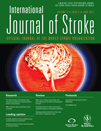
International Journal of Stroke
Empowering Clinicians with Evidence-Based StrategiesThe International Journal of Stroke, published by SAGE PUBLICATIONS LTD, is a leading peer-reviewed journal dedicated to advancing the field of stroke research and clinical practice. Established with a commitment to disseminating high-quality scholarly articles, this journal has rapidly progressed to achieve a prestigious Q1 ranking in both Neurology and Clinical Neurology categories as of 2023. With a remarkably high Scopus rank of #7 among 192 in Neuroscience and #16 among 400 in Clinical Neurology, it places itself firmly in the top 4% of journals in its field, reflecting its significant impact on the academic and clinical landscape. Although it does not currently offer Open Access options, the journal provides a vital platform for researchers and clinicians alike, focusing on innovative treatments, methodologies, and evolving strategies for stroke prevention and recovery. With a publication scope that spans from 2006 to 2024, the International Journal of Stroke continues to foster knowledge exchange and encourage collaboration, making it an essential resource for anyone involved in neurologic healthcare.
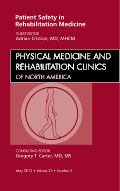
Physical Medicine and Rehabilitation Clinics of North America
Empowering practitioners with critical insights.Physical Medicine and Rehabilitation Clinics of North America is a leading journal published by W B Saunders Co-Elsevier Inc., focusing on the multifaceted disciplines of physical medicine, rehabilitation, and related health professions. With an impressive impact factor reflecting its significant contribution to the field, this journal ranks in the Q2 quartile for both Physical Therapy and Rehabilitation categories. The journal, available in both print (ISSN: 1047-9651) and online (E-ISSN: 1558-1381), provides critical insights, clinical updates, and comprehensive reviews that are essential for researchers, practitioners, and students alike. Covering a wide spectrum of topics from innovative rehabilitation techniques to emerging trends in sports medicine, it aims to disseminate knowledge that enhances patient care and drives advancements in rehabilitation practices. With a publication history spanning from 1995 to 2024, Physical Medicine and Rehabilitation Clinics is an essential resource for those dedicated to improving functional outcomes and the quality of life for patients worldwide.

ARYA Atherosclerosis
Connecting researchers to elevate cardiovascular medicine.ARYA Atherosclerosis is a distinguished open-access journal published by Isfahan University of Medical Sciences and the Isfahan Cardiovascular Research Center, with an ISSN of 1735-3955 and an E-ISSN of 2251-6638. Founded in 2005, this journal seeks to advance the field of cardiology and cardiovascular medicine by providing a platform for researchers, healthcare professionals, and scholars to disseminate groundbreaking findings related to atherosclerosis and its implications for cardiovascular health. Although currently ranked in Q4 of its category in 2023, ARYA Atherosclerosis plays a vital role in the academic community by promoting open access to vital research, fostering collaboration, and encouraging the sharing of knowledge. The journal's commitment to transparency and accessibility makes it an essential resource for those looking to stay informed about the latest developments in cardiovascular research. Based in Iran, it is positioned within an emerging research landscape that is increasingly contributing to global health discussions.